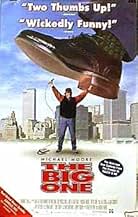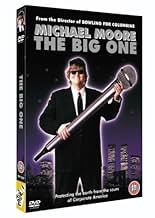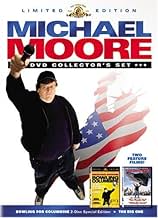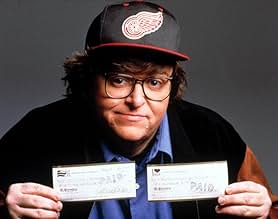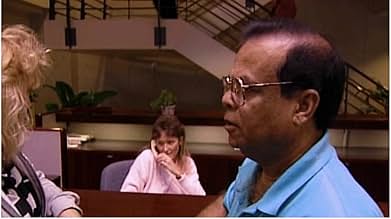IMDb-BEWERTUNG
7,1/10
8111
IHRE BEWERTUNG
Füge eine Handlung in deiner Sprache hinzuOn his book tour, Michael Moore exposes wrongdoing by big greedy businesses and callous politicians around America.On his book tour, Michael Moore exposes wrongdoing by big greedy businesses and callous politicians around America.On his book tour, Michael Moore exposes wrongdoing by big greedy businesses and callous politicians around America.
- Auszeichnungen
- 6 wins total
Bill Clinton
- Self - Presidential Candidate
- (Archivfilmmaterial)
Jim Czarnecki
- Self
- (as Jim)
Brian Danitz
- Self
- (as Brian)
Robert Dornan
- Self - Congressman
- (Archivfilmmaterial)
Steve Forbes
- Self - Presidential Candidate
- (Archivfilmmaterial)
Empfohlene Bewertungen
Michael Moore's The Big One is a typical Michael Moore documentary. By this post-Bowling for Columbine and present Fahrenheit 91I time period, much of America and the world know of Moore's feet first documentaries. With Moore becoming the funnier Mike Wallace of the '90s and shoving a microphone in the face of corporate and political bad guys at every turn, Moore again stirs up the corporate status quo in The Big One, released in 1998. The film covers the most threatening aspect to the American way of life at the time: corporate downsizing. The setting is the Midwest and Moore travels to small midwestern cities, most often the ones hit hardest by the factory closings and layoffs of the late '90s. While not as focused or even as serious as Moore's most recent efforts, this film is still reminiscent to his others in that it is both funny and thought provoking.
Most likely unintended by Moore when filming, this film feels more like a time capsule than anything else. While factory closings and layoffs have continued into the 2000s, the impact the closings of the'90s had on America are far greater than the layoffs of today. A documentary on corporate downsizing today would be lost amongst the far more serious issues of U.S foreign policy and all it is related to, including terrorism, the Patriot Act and homeland security, Iraq, and Afghanistan. Factory closings and plant layoffs in exchange for higher corporate profits are an important issue, but when viewed six years later, this film seems almost insignificant.
The Big One covers American politics as an extension of corporate America in that both elite politicians and elite CEOs are essentially the same type of person. In one segment, Moore covers the most recent presidential campaign, and in a series of interviews, many people say that they refused to vote because both candidates in 1996 were the same person; the only difference was their political party name. Today, America is so polarized politically that the idea of refusing to vote based on the fact that the candidates are too similar is not only incorrect, but also outlandish. However, one must remember that Moore was first a journalist, and his films are news-based, and by the hand, are not meant to have the longest of shelf lives. At their best, they are perfect time capsules of various issues facing America at a certain time period.
Moore is highly visible in this film as he was in 1989's Roger and Me, only using his interview subjects to further his story and cause. While he does allow the characters to speak for themselves, they are only backing up his claims and not necessarily adding any more to the film than mere quotes. Moore's feelings and political motives are what make up this documentary, and they come through 100% to the viewer as Moore makes a convincing case for his cause.
The film's use of humorous stock footage, broadcast news reports, and stand-up comedy scenes with Moore behind the microphone make for entertaining segments that either divert the viewer from the story and provide for some comic relief, or conversely, further the story when the footage has a sharp political undercurrent. Moore's juxtaposition of serious-minded news reports as the build up with one of his narrated comments as the punch line are entertaining and part of what make his documentaries fun to watch as well as informative.
The Big One, while it does not necessarily have as solid of a story as Moore's other films and may be criticized for coming off as a 90-minute commercial for Moore's book, Downsize This, does manage to string together a few interviews with humor and a serious issue to effectively promote Moore's cause. Although we know Nike CEO and Moore interviewee Phil Knight would never put a Nike shoe factory anywhere in the US, much less in Moore's hometown of Flint, Michigan, the fact that Moore asked Knight to do so concisely summarizes Moore's message and wish: that US-owned companies stop closing factories and outsourcing to cheaper foreign markets and start giving US workers their jobs back. Anyone who has taken an international business course or even perused the Wall Street Journal knows outsourcing will continue. Moore's ability to increase the public's awareness is his best trait as a filmmaker, not his attempt to single handedly change the entire face of US and international business.
The soundtrack, like other Moore films, is mostly there for humorous purposes. Moore lets the most serious moments in his films go without any sound other than the person weeping or ranting for maximum effect. That being said, his use of humorous songs including Americana classics pace the film and add to its quick nature. Moore only uses scene titles sparingly, as his narration divides the film verbally. The use of scene titles is not necessary when Moore is walking his viewers through the film.
Funded by the British Broadcasting Company, Moore's budget is much more than his contemporaries', but even a large budget cannot save this film. His choice of story topic is not lasting enough to appeal to viewers not living with the economic divisions between rich and poor of the late 1990s. Also, if Moore had let the story lead him to various locations across the country instead of his book tour navigating, maybe he would have found out more information and created something better than The Big One. Additionally, perhaps if Moore had narrowed his ideas of what he wanted to cover before he started filming ('The Big One' refers to the US as the 'big' country) instead of attempting to cover American politics, the economy and sagging social standards all in one 90-minute documentary, his ideas would have came across even clearer than they already do. This is where Moore succeeds in his later films, especially Bowling For Columbine, which strictly focuses on a single issue with minimal sidebars.
Sources of tension in this film go from the comedic sources ('media escorts,' i.e. middle age blonde women who cannot handle Moore's independent spirit) to the most serious ones (the US government and big business). He tries to grapple too much in The Big One, and that is where this film ultimately fails.
Most likely unintended by Moore when filming, this film feels more like a time capsule than anything else. While factory closings and layoffs have continued into the 2000s, the impact the closings of the'90s had on America are far greater than the layoffs of today. A documentary on corporate downsizing today would be lost amongst the far more serious issues of U.S foreign policy and all it is related to, including terrorism, the Patriot Act and homeland security, Iraq, and Afghanistan. Factory closings and plant layoffs in exchange for higher corporate profits are an important issue, but when viewed six years later, this film seems almost insignificant.
The Big One covers American politics as an extension of corporate America in that both elite politicians and elite CEOs are essentially the same type of person. In one segment, Moore covers the most recent presidential campaign, and in a series of interviews, many people say that they refused to vote because both candidates in 1996 were the same person; the only difference was their political party name. Today, America is so polarized politically that the idea of refusing to vote based on the fact that the candidates are too similar is not only incorrect, but also outlandish. However, one must remember that Moore was first a journalist, and his films are news-based, and by the hand, are not meant to have the longest of shelf lives. At their best, they are perfect time capsules of various issues facing America at a certain time period.
Moore is highly visible in this film as he was in 1989's Roger and Me, only using his interview subjects to further his story and cause. While he does allow the characters to speak for themselves, they are only backing up his claims and not necessarily adding any more to the film than mere quotes. Moore's feelings and political motives are what make up this documentary, and they come through 100% to the viewer as Moore makes a convincing case for his cause.
The film's use of humorous stock footage, broadcast news reports, and stand-up comedy scenes with Moore behind the microphone make for entertaining segments that either divert the viewer from the story and provide for some comic relief, or conversely, further the story when the footage has a sharp political undercurrent. Moore's juxtaposition of serious-minded news reports as the build up with one of his narrated comments as the punch line are entertaining and part of what make his documentaries fun to watch as well as informative.
The Big One, while it does not necessarily have as solid of a story as Moore's other films and may be criticized for coming off as a 90-minute commercial for Moore's book, Downsize This, does manage to string together a few interviews with humor and a serious issue to effectively promote Moore's cause. Although we know Nike CEO and Moore interviewee Phil Knight would never put a Nike shoe factory anywhere in the US, much less in Moore's hometown of Flint, Michigan, the fact that Moore asked Knight to do so concisely summarizes Moore's message and wish: that US-owned companies stop closing factories and outsourcing to cheaper foreign markets and start giving US workers their jobs back. Anyone who has taken an international business course or even perused the Wall Street Journal knows outsourcing will continue. Moore's ability to increase the public's awareness is his best trait as a filmmaker, not his attempt to single handedly change the entire face of US and international business.
The soundtrack, like other Moore films, is mostly there for humorous purposes. Moore lets the most serious moments in his films go without any sound other than the person weeping or ranting for maximum effect. That being said, his use of humorous songs including Americana classics pace the film and add to its quick nature. Moore only uses scene titles sparingly, as his narration divides the film verbally. The use of scene titles is not necessary when Moore is walking his viewers through the film.
Funded by the British Broadcasting Company, Moore's budget is much more than his contemporaries', but even a large budget cannot save this film. His choice of story topic is not lasting enough to appeal to viewers not living with the economic divisions between rich and poor of the late 1990s. Also, if Moore had let the story lead him to various locations across the country instead of his book tour navigating, maybe he would have found out more information and created something better than The Big One. Additionally, perhaps if Moore had narrowed his ideas of what he wanted to cover before he started filming ('The Big One' refers to the US as the 'big' country) instead of attempting to cover American politics, the economy and sagging social standards all in one 90-minute documentary, his ideas would have came across even clearer than they already do. This is where Moore succeeds in his later films, especially Bowling For Columbine, which strictly focuses on a single issue with minimal sidebars.
Sources of tension in this film go from the comedic sources ('media escorts,' i.e. middle age blonde women who cannot handle Moore's independent spirit) to the most serious ones (the US government and big business). He tries to grapple too much in The Big One, and that is where this film ultimately fails.
The Big One (1997) presents itself as a spontaneous documentary of Michael Moore's outrageous adventures during the tour of his book, "Downsize This!" Moore does a good job of focusing on what's wrong in America- people work 60+ hours a week just to get by, profitable, productive factories closing to move to Mexico where workers are paid 60 cents an hour.
Unfortunately, for all of Moore's focused anger at corporate America, Moore doesn't offer much of a solution. When someone asks him why he didn't limit his book tour to union or non-corporate stores, he makes a joke about the success of his book changing his politics. Moore asks a corporate spokesperson if she thinks it's a good idea for the US to pass punitive laws against profitable corporations who export their labor to other countries. This is admirable, but I wish he had followed up on his own question.
In this film, Moore comes across as someone who has spent a lot of time focused on America's problems, but spends only a token effort in dwelling on potential solutions. This imbalance handicaps what could have been a sublimely entertaining, informative documentary. I expected information at the end of the movie about corporate ethics organizations like Corporate Watch (http://www.corpwatch.org) or information on how to start a labor union (http://www.aflcio.org). Alas, no such luck.
Despite its faults, The Big One (1997) is a must-see for anyone who believes 1) unions are corrupt; 2) corporations are corrupt; or 3) earns a salary of less than six figures a year.
Unfortunately, for all of Moore's focused anger at corporate America, Moore doesn't offer much of a solution. When someone asks him why he didn't limit his book tour to union or non-corporate stores, he makes a joke about the success of his book changing his politics. Moore asks a corporate spokesperson if she thinks it's a good idea for the US to pass punitive laws against profitable corporations who export their labor to other countries. This is admirable, but I wish he had followed up on his own question.
In this film, Moore comes across as someone who has spent a lot of time focused on America's problems, but spends only a token effort in dwelling on potential solutions. This imbalance handicaps what could have been a sublimely entertaining, informative documentary. I expected information at the end of the movie about corporate ethics organizations like Corporate Watch (http://www.corpwatch.org) or information on how to start a labor union (http://www.aflcio.org). Alas, no such luck.
Despite its faults, The Big One (1997) is a must-see for anyone who believes 1) unions are corrupt; 2) corporations are corrupt; or 3) earns a salary of less than six figures a year.
The movie is frequently reminiscent of Letterman, visiting corporate headquarters with silly stunts - there's no way for the victims to win; even when they play along, as Phil Knight tries to, there's no room for rational argument. Moore is pretty engaging and energetic, but it soon becomes apparent that his movie has little ambition other than to string together such diverting moments and to hammer away at the main anti-downsizing theme. Astonishing that everyone makes the opposing case so poorly - it's a walk over; an overwhelming victory for the Forces Of Good. But Moore doesn't address the broader revolutions that would be required to make his ideas stick - the corporate heads are surely culpable, but if they didn't play along they'd be fired: it's investment-obsessed America (Beardstown Ladies and all) that keeps this crazy cycle going. Moore has a great gift for getting into the middle of activity and is a great raconteur, but for someone so relentlessly pure on hammering at the same anti-capitalist drum he leaves his own success conspicuously unexamined. The ragbag style is always entertaining though and the film has an appealing zippy pace - reservations aside, the uncertain encounter with Knight makes for a good climax.
Michael Moore's latest documentary focuses on his new book and more assorted attacks on corporations which he deems as inferior or greedy. Although it is somewhat interesting, it is nowhere near as important as 1989's "Roger & Me", which was strongly valid in argument. (When GM CEO Roger Smith laid off thousands of workers just for cheap labor in Mexico, it was probably one of the most dispicable things anyone with four limbs has done.)
But the bad timing is nowhere near severe as the hypocrisy. For example, shortly before the messy 2000 Presidential election, Salon magazine surfaced Ralph Nader's 1999 tax returns revealing that he owns a mutual fund with stocks in Walmart, The Gap and an affiliate of Halliburton Oil (all of which came under fierce attack from the Moore/Nader team) This crusade courtesy of the Naderites may have erroneously lead to the wrong guy being in office, and the Moore/Nader team have taken no responsiblity to their actions, or the hypocrisy which surfaced when the Green Party candidate's stocks appeared.
This just goes to show that investigative commentary can lead to contradictions and often diminish credibility in argument.
But the bad timing is nowhere near severe as the hypocrisy. For example, shortly before the messy 2000 Presidential election, Salon magazine surfaced Ralph Nader's 1999 tax returns revealing that he owns a mutual fund with stocks in Walmart, The Gap and an affiliate of Halliburton Oil (all of which came under fierce attack from the Moore/Nader team) This crusade courtesy of the Naderites may have erroneously lead to the wrong guy being in office, and the Moore/Nader team have taken no responsiblity to their actions, or the hypocrisy which surfaced when the Green Party candidate's stocks appeared.
This just goes to show that investigative commentary can lead to contradictions and often diminish credibility in argument.
As one user before said, he feels the film to be more of a time capsule today, since the impacts and importance of downsizing has been overwritten by other issues like terrorism, homeland security, 9/11 etc.
Well, I live in Europe and I can just say that here in Europe the film just comes out on DVD (I saw it only yesterday, July 15th, 2004 on TV) at the right time for Europe (if not a little too late). Economical matters are getting worse here in Europe day by day, and the patterns CEO's use to make their companies "profitable" (which should just always correctly read: "MORE profitable) are just the same as CEO's use in the USA. In fact, the only idea that comes to their minds is: downsizing, laying off people and transferring labour into countries with extremely cheap labour-cost. That's all.
Surprisingly there is just very little resistance to these tendencies, even though Europe is (in most countries) far better organised as far as Labour Unions are concerned. People are told by politicians that reforms are necessary, and people just sit back and accept it and continue to suffer.
In this context, "The Big One" by Michael Moore just comes at the right time here in Europe, even though I think that not many of the concerned people will actually see it.
But it's worth watching it, even though sometimes I questioned myself how I could laugh over such sad facts. But this is the virtue of Michael Moore and this film: it doen't leave you desperate, it gives you a laugh at the time and maybe, if we're all lucky, it will lead to a better organisation of the people concerned and to more resistance against the 1 percent of the rich keeping the rest in poverty.
Well, I live in Europe and I can just say that here in Europe the film just comes out on DVD (I saw it only yesterday, July 15th, 2004 on TV) at the right time for Europe (if not a little too late). Economical matters are getting worse here in Europe day by day, and the patterns CEO's use to make their companies "profitable" (which should just always correctly read: "MORE profitable) are just the same as CEO's use in the USA. In fact, the only idea that comes to their minds is: downsizing, laying off people and transferring labour into countries with extremely cheap labour-cost. That's all.
Surprisingly there is just very little resistance to these tendencies, even though Europe is (in most countries) far better organised as far as Labour Unions are concerned. People are told by politicians that reforms are necessary, and people just sit back and accept it and continue to suffer.
In this context, "The Big One" by Michael Moore just comes at the right time here in Europe, even though I think that not many of the concerned people will actually see it.
But it's worth watching it, even though sometimes I questioned myself how I could laugh over such sad facts. But this is the virtue of Michael Moore and this film: it doen't leave you desperate, it gives you a laugh at the time and maybe, if we're all lucky, it will lead to a better organisation of the people concerned and to more resistance against the 1 percent of the rich keeping the rest in poverty.
Wusstest du schon
- WissenswertesMichael Moore: [Flint] Moore tries to convince Phil Knight to open a factory in Flint, Michigan.
- Zitate
Michael Moore: [referring to McDonald's] They put vegetables on my fish filet. Fuckers.
- Crazy CreditsTo make a reservation on TWA call 1-800-221-2000
- SoundtracksPanic In Detroit
(1973)
Written and Performed by David Bowie
Courtesy of Jones/Tintoretto Entertainment Co., LLC
By kind permission of Tintoretto Music/RZO Music
EMI Publishing Ltd., Chrysalis Music
Top-Auswahl
Melde dich zum Bewerten an und greife auf die Watchlist für personalisierte Empfehlungen zu.
- How long is The Big One?Powered by Alexa
Details
- Erscheinungsdatum
- Herkunftsländer
- Offizieller Standort
- Sprache
- Auch bekannt als
- The Big One
- Drehorte
- Produktionsfirmen
- Weitere beteiligte Unternehmen bei IMDbPro anzeigen
Box Office
- Bruttoertrag in den USA und Kanada
- 720.074 $
- Eröffnungswochenende in den USA und in Kanada
- 146.909 $
- 12. Apr. 1998
- Weltweiter Bruttoertrag
- 720.074 $
Zu dieser Seite beitragen
Bearbeitung vorschlagen oder fehlenden Inhalt hinzufügen

Oberste Lücke
By what name was Der grosse Macher (1997) officially released in Canada in English?
Antwort
